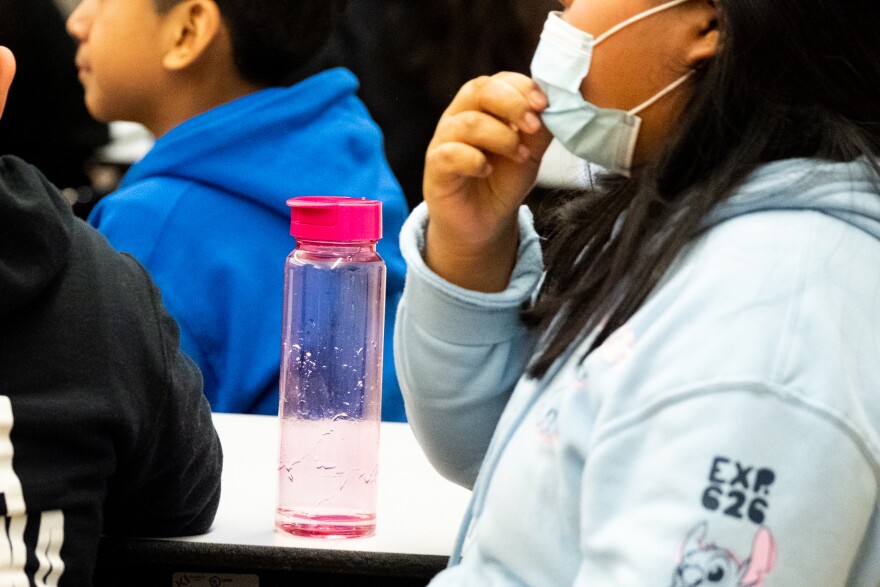Walking into the Maureen Joy Charter School building is a little like stepping back in time. The lacquered wood floors creak as students walk to class. Sunlight streams across high ceilings. The school’s chief operating officer Samantha Amaral offers a tour of the building.
“It was built in 1910, so this is a historic building, and we love it,” Amaral says.
A black-and-white photograph hanging in the lobby shows a street view of the original school building in 1910, seemingly unchanged. Maureen Joy Charter School renovated the old Y.E. Smith public school building in 2012 before moving in.
“They redid all of the piping, all of the paint,” Amaral explained. “All that was left was the skeleton of the school.”
Amaral said she hopes that means the school doesn’t have to worry as much about lead in the pipes or asbestos in the paint, but given the age of the building, administrators still wanted to check.
More than half of North Carolina public schools were built before the federal government began regulating lead and asbestos in new construction in the 1980s, putting today’s students at risk for lead exposure. Lead in drinking water is a health risk to young children and can cause intellectual and developmental issues. Asbestos is a known carcinogen.
Now, with a large block of federal funding from the American Rescue Plan and allocated by the state, every one of the roughly 3,100 public schools in North Carolina this spring will be able to test for lead and asbestos.
Clean Classrooms for Carolina Kids
Amaral said she looked into conducting water testing around the time when the charter school moved into its more than 100-year-old school building.
“It's just expensive,” she said.

Amaral said a water testing company quoted the job at hundreds of thousands of dollars — far beyond what the school could afford — and that didn’t include the cost of cleanup if any lead was found.
Then this year, Amaral got an email from the Department of Public Instruction saying that all public schools, including charter schools, would be required to test their drinking water for lead and older paint for asbestos. The good news was that federal funds would foot the bill. The program is called Clean Classrooms for Carolina Kids.
“I was like, this can't be real,” Amaral recalled. “So you're mandating this, and you're bringing support? And you're making it super easy for us? Where's the catch? And there isn't any.”
Schools can sign up online, receive training in collecting samples and mail them in for testing. All schools are required to enroll in the program by May 1.
School’s maintenance director says sampling was surprisingly easy
Maureen Joy Charter School’s maintenance director Raymond Melvin demonstrates how he collected water from drinking fountains. First, he opens a sterile bottle, fills it at a water tap and places it in a large plastic bag.
“It was a very easy process,” Melvin said. “Basically, it took me less than 30 to 40 minutes to get it all done on three floors.”

Melvin sampled every source of drinking water in the building.
“Lead in the water is never acceptable, first of all, okay,” Melvin said. “We send it in to them. They basically tell us whether there's lead in the water, then we work together as a partnership to resolve that issue.”
The partnership is with RTI International, a nonprofit based in Research Triangle Park. RTI is working with the North Carolina Department of Health and Human Services to use $150 million in American Rescue Plan funding for testing and mitigation. The Department of Public Instruction is working as a liaison to communicate the requirement to schools.
“This is once-in-a-generation funding,” said Jennifer Hoponick Redmon, director of the Clean Classrooms program at RTI.
Program includes funding to make repairs and replacements
Redmon said state lawmakers and school officials began having concerns about lead in school buildings after the Flint water crisis became public around 2015.
Following that crisis, Charlotte-Mecklenburg Schools spent thousands of dollars testing water fountains for lead and replacing infrastructure at dozens of schools with unsafe levels from 2017 to 2018.
Redmon said there was no particular reason for there to be lead in that school district and not others, but many other schools simply haven’t been tested until this program came along.

Redmon said what's remarkable about this new funding is that about a third of the $150 million is earmarked for mitigation.
“We're not just finding a problem. Our goal is to help fix the problem," Redmon said.
If a tap at a school does test positive for lead, the school can request funding to replace faucets and infrastructure. Redmon said sometimes it’s surprising which taps do test positive, because even schools with newer pipes can have low levels of lead, and exposure levels vary from faucet to faucet.
“If we find a tap that has detectable lead, sometimes the tap right next to it is totally fine,” Redmon said. “That's why it's really important to test every tap.”
All the testing results from schools across the state are publicly available on this online database. The database also includes results from childcare facilities across North Carolina that RTI tested in an earlier iteration of the program.
At Maureen Joy Charter School, despite that recent renovation, testing results showed minor levels of lead in several faucets. None of the taps exceeded the state action level for lead, but two faucets were above a stricter level recommended by the American Academy of Pediatrics.
Amaral said, thanks to the funding and support, this was quickly remedied and communicated to families.
“We were able to replace those faucets within a week or so,” Amaral said. “We're just grateful to be able to do this for our kids and show that our kids are worth it.”
Clean Classrooms for Carolina Kids is still working to enroll every school across the state by May 1, so testing can be completed before the federal funding expires.





